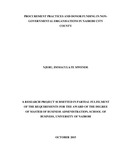| dc.description.abstract | With the worldwide fluctuation in donor funding and considering that most NonGovernmental Organisations are not self-sustaining; they have to know what factors the
donors are putting into consideration during funding and especially the kind of controls
that should be in place to facilitate smooth running of the organisations. NonGovernmental Organisations operate under very high budgets whose funding certainty is
never known and where most funds are utilized in their operations; especially through the
procurement department. Thus strict controls have to be put in place and donor guidelines
on procurement practices have to be followed to the core. The study sought to find out
the effect of procurement practices on donor funding in Non-Governmental Organisations
in Nairobi. It was interested in the analysis of this relationship because donor funding has
been fluctuating over the years with some considerable decrease in some years. There are
so many factors that affect funding and considering that procurement mainly takes up
about 75% of the resources in most NGOs; the donor is keen on how the NGO does it and
if the right channels are being used. Procurement is therefore a key factor in donor
funding considerations. Withdrawal or reduction of funding by some donors has been
attributed to corporate misconduct, lack of controls, government corruption, bureaucracy,
project implementation among other factors. However, little is known on the
procurement practices used by NGOs and how they directly affect donor funding. Thus,
the objective of the study was to establish the procurement practices used by NGOs in
Nairobi and to establish how their effect on donor funding. The descriptive study targeted
a sample of 95 NGOs to which questionnaires targeted a population of 95 government
ministries that existed during the coalition government. The study used primary data
sources from the NGOs and secondary data from various donors and NGOs reports. The
study concludes that the most common procurement practices used by NGOs are
procurement database, use of review committees and scorecard during evaluation. Donors
mainly emphasized on transparency, accountability and integrity during project
evaluation | en_US |

